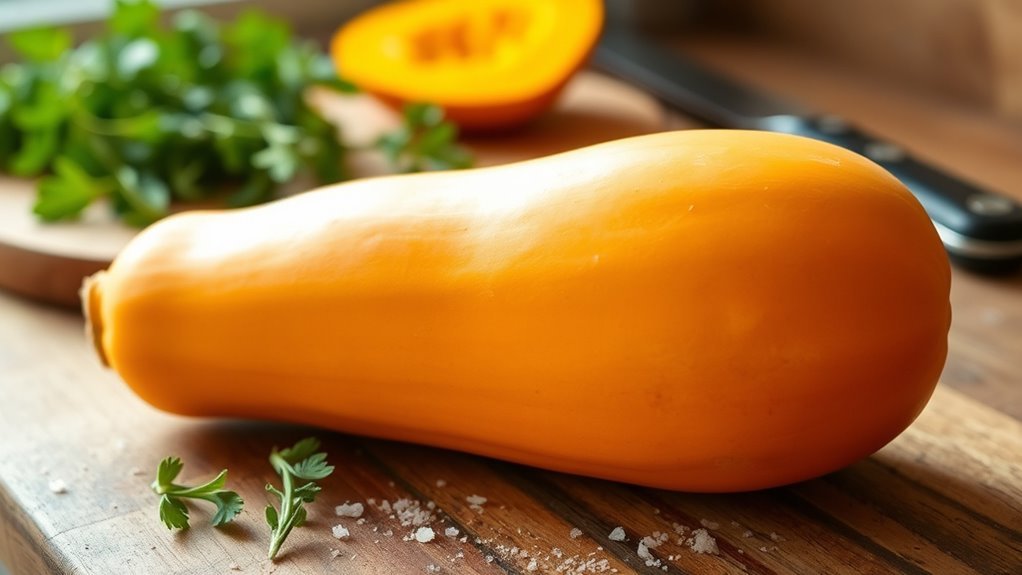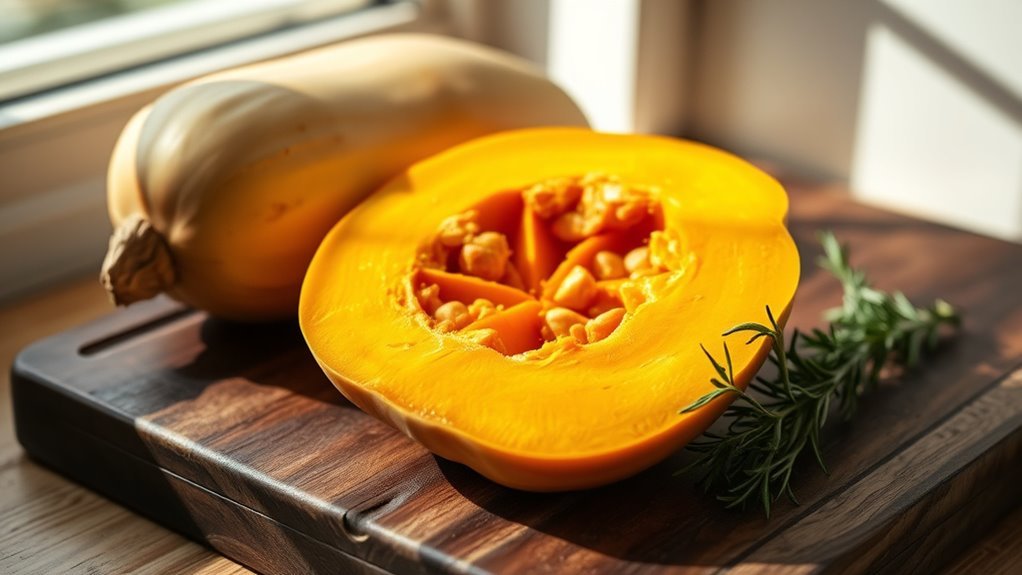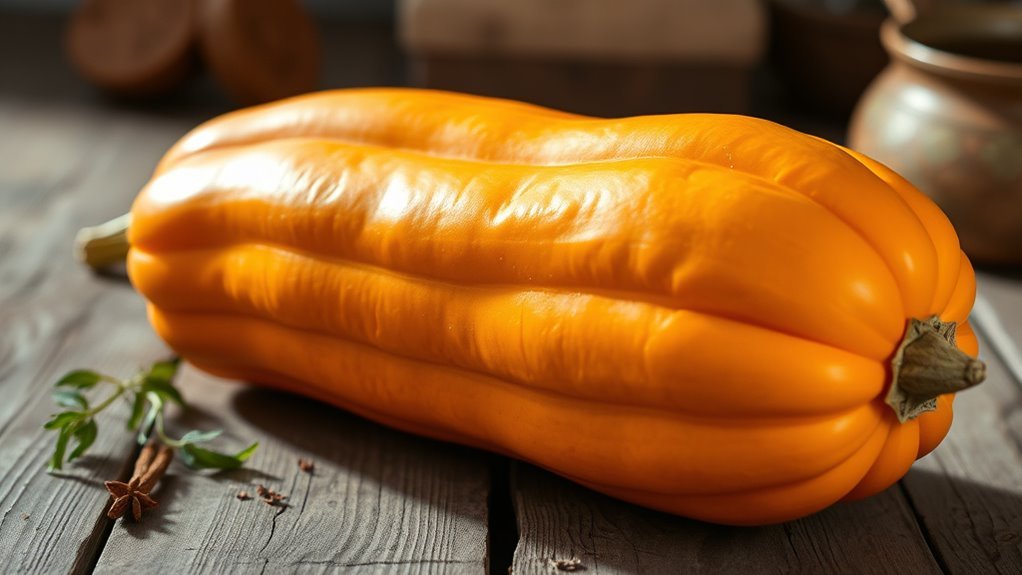Butternut squash isn’t strictly keto-friendly due to its moderate carbohydrate content, with around 14 grams of net carbs per 100 grams. If you’re following a strict ketogenic diet, managing your portions is essential. A recommended serving is about half a cup cooked, which can fit into your daily carb limit. While it can add flavor and nutrition to your meals, keep in mind other lower-carb alternatives. Explore more on how to incorporate it effectively into your diet.
Understanding the Ketogenic Diet

When you immerse yourself in the ketogenic diet, you’ll find it’s not just a trendy eating plan but a scientifically-backed approach to nutrition. The ketogenic principles center around drastically reducing carbohydrate intake while increasing your consumption of dietary fat. This shift encourages your body to enter a state of ketosis, where it efficiently burns fat for energy instead of relying on carbs. By prioritizing healthy fats, like avocados and olive oil, you’ll potentially experience improved energy levels, mental clarity, and weight loss. Understanding these core principles empowers you to make informed choices, enhancing your dietary freedom. Embracing the ketogenic lifestyle means you’re not just following a diet; you’re adopting a sustainable way of living that aligns with your health goals.
Nutritional Profile of Butternut Squash

Butternut squash is often celebrated for its rich flavor and versatility in cooking, but it also boasts a remarkable nutritional profile. Here’s what makes it a standout choice:
Butternut squash shines with its rich flavor and impressive nutrition, making it a versatile and healthy cooking choice.
- High in Vitamins: Packed with vitamins A and C, it supports immune function and skin health.
- Rich in Fiber: This aids digestion and helps maintain a healthy gut.
- Low in Calories: Perfect for those looking to enjoy a filling dish without excess calories.
- Seasonal Availability: Typically found from late summer to early winter, you can enjoy its fresh taste when it’s at its peak.
The butternut squash benefits are numerous, making it a nutritious addition to your meals and a wonderful way to celebrate seasonal produce.
Carbohydrate Content in Butternut Squash

When considering butternut squash on a keto diet, it’s crucial to look at its carbohydrate content. This vegetable contains about 12 grams of carbs per 100 grams, which is higher compared to many leafy greens. Understanding this nutritional breakdown can help you compare it to other vegetables and make informed choices for your meal planning.
Nutritional Breakdown Overview
The nutritional profile of butternut squash reveals its carbohydrate content, which is a crucial factor for those following a ketogenic diet. While it offers some nutritional benefits, its carb count can be a concern. Here’s a breakdown of its carbohydrate content:
- Total Carbohydrates: About 16 grams per cup (cooked).
- Dietary Fiber: Roughly 2 grams, which helps with digestion.
- Net Carbs: Approximately 14 grams after subtracting fiber.
- Cooking Methods: Roasting, steaming, or mashing can enhance its flavor while impacting its carb count.
If you’re mindful of your carbs, you might want to limit how much butternut squash you include in your meals. Exploring various cooking methods can help you enjoy it in moderation while keeping your keto goals in check.
Comparison With Other Vegetables
While butternut squash is a popular choice for many home cooks, its carbohydrate content can be compared to that of other vegetables to better understand its place in a ketogenic diet. Typically, butternut squash contains about 12 grams of carbs per cup, making it higher in carbs than some leafy greens like spinach or kale, which have negligible carbs. However, when compared to starchy vegetables like potatoes, butternut squash offers a lower carb alternative. Different vegetable varieties come with unique texture differences and flavor profiles, which can influence your cooking methods. Seasonal availability also plays a role; butternut squash shines in fall, providing a hearty, sweet option while remaining mindful of your carb intake.
Glycemic Index of Butternut Squash
Butternut squash has a relatively low glycemic index (GI) of around 51, making it a suitable option for those following a keto diet. Its glycemic load is also moderate, which means it won’t spike your insulin response dramatically. Here’s what you can expect when including it in your meals:
- Nutrient-dense: Packed with vitamins A and C.
- Fiber-rich: Aids digestion and keeps you full.
- Versatile: Can be roasted, pureed, or added to soups.
- Flavorful: Offers a sweet, nutty taste that enhances dishes.
Comparing Butternut Squash to Other Vegetables
When comparing butternut squash to other vegetables, it’s essential to contemplate their nutritional profiles and how they fit into a keto diet. Butternut squash has a higher carbohydrate content compared to zucchini and cauliflower, making it less ideal for strict keto followers.
| Vegetable | Net Carbs (per 100g) |
|---|---|
| Butternut Squash | 12g |
| Zucchini | 3g |
| Cauliflower | 2g |
In the butternut squash vs. zucchini debate, zucchini clearly offers fewer carbs. Meanwhile, when you look at butternut squash vs. cauliflower, cauliflower stands out as the more keto-friendly option. Understanding these differences can help you make informed choices in your diet.
Benefits of Butternut Squash
Butternut squash is packed with nutrients, making it a fantastic addition to your diet. It offers a rich source of vitamins A and C, along with fiber, which can support overall health. Additionally, its antioxidant properties may help combat oxidative stress, promoting wellness.
Nutrient Density Profile
Although many people associate butternut squash with comfort food, its nutrient density makes it a valuable addition to a balanced diet. This vibrant vegetable not only satisfies your taste buds but also offers significant health benefits through enhanced nutrient absorption. Here are some key vitamin benefits you’ll enjoy:
- Vitamin A: Supports eye health and immune function.
- Vitamin C: Boosts collagen production and aids in wound healing.
- Vitamin E: Acts as an antioxidant, protecting your cells from damage.
- B Vitamins: Essential for energy metabolism and brain health.
Incorporating butternut squash into your meals can enrich your diet, making it easier to meet your nutritional needs while enjoying that comforting flavor.
Antioxidant Properties
While you may enjoy the rich flavor of butternut squash, its antioxidant properties can provide additional health benefits that are hard to ignore. This vibrant squash is packed with beta-carotene, a powerful antioxidant that converts to vitamin A in your body. These antioxidant benefits help combat oxidative stress, potentially reducing the risk of chronic diseases like heart disease and cancer. Furthermore, butternut squash contains vitamin C and other phytonutrients that further enhance its health impacts, supporting your immune system and promoting skin health. Including butternut squash in your diet not only satisfies your taste buds but also fortifies your body with essential nutrients, empowering you to take charge of your well-being. So, go ahead and indulge in this delicious, nutrient-rich veggie!
How to Incorporate Butternut Squash Into Keto Meals
When exploring ways to incorporate butternut squash into your keto meals, it’s essential to take into account portion sizes and preparation methods to keep your carbohydrate intake in check. Here are some delicious ideas for keto meal planning:
Incorporating butternut squash into your keto meals requires mindful portion sizes and preparation to maintain low carb intake.
- Roasted butternut squash: Toss cubes with olive oil, salt, and spices, then roast until tender.
- Butternut squash soup: Blend cooked squash with bone broth and seasonings for a creamy delight.
- Squash noodles: Spiralize or slice thinly for a low-carb alternative to pasta in your favorite dishes.
- Stuffed squash: Fill halved squash with seasoned ground meats and veggies for a hearty meal.
These methods can help you enjoy butternut squash while maintaining your keto lifestyle.
Portion Control and Serving Sizes
When incorporating butternut squash into your keto diet, it’s essential to pay attention to serving sizes. A recommended serving is typically around half a cup cooked, which helps you maintain balanced carbohydrate intake. By keeping portions in check, you can enjoy the flavors of butternut squash without exceeding your daily carb limits.
Recommended Serving Sizes
To effectively incorporate butternut squash into a keto diet, understanding recommended serving sizes is essential. This tasty vegetable can fit your meal plan with the right portion recommendations. Here are some serving suggestions to keep in mind:
- Half a cup of cooked butternut squash contains about 12 grams of carbs.
- One cup of cubed raw squash offers around 15 grams of carbohydrates.
- Two tablespoons of butternut squash puree provide about 4 grams of carbs.
- A small serving, approximately 1/4 cup, helps you enjoy the flavor without overdoing it.
Balancing Carbohydrate Intake
Balancing carbohydrate intake is essential for maintaining ketosis, especially when incorporating foods like butternut squash into your diet. To effectively manage your net carbs, consider portion control and serving sizes. You might find carb cycling beneficial, allowing you to enjoy moderate amounts of higher-carb foods on select days while staying within your overall carb limit.
Here’s a simple table to guide you:
| Food Item | Net Carbs per Serving |
|---|---|
| Butternut Squash | 12g (1 cup, cooked) |
| Zucchini | 2g (1 cup, cooked) |
| Cauliflower | 2g (1 cup, cooked) |
| Spinach | 1g (1 cup, cooked) |
Keep these portions in mind to maintain your keto lifestyle while enjoying a variety of flavors.
Recipes Featuring Butternut Squash for Keto Dieters
Butternut squash can be a delightful addition to your keto meal rotation, offering a unique flavor and texture. You can enjoy this versatile vegetable in various ways that won’t derail your diet. Here are some tasty recipes to try:
Butternut squash adds unique flavor and texture to your keto meals, offering delicious, low-carb recipe options.
- Butternut Squash Soup: Blend roasted butternut squash with coconut milk and spices for a creamy, comforting dish.
- Roasted Butternut Squash: Toss cubes with olive oil, salt, and pepper, then roast until caramelized for a savory side.
- Stuffed Butternut Squash: Fill halves with sautéed greens, cheese, and nuts for a hearty meal.
- Butternut Squash Mash: Steam and mash with butter and garlic for a keto-friendly alternative to mashed potatoes.
These recipes keep your meals exciting while keeping carbs in check!
Alternatives to Butternut Squash on a Keto Diet
Are you looking for alternatives to butternut squash that fit within your keto diet? You’ve got plenty of delicious options! Zucchini noodles are a fantastic low-carb substitute for pasta, allowing you to enjoy your favorite dishes guilt-free. Cauliflower rice offers a versatile base for stir-fries and casseroles, delivering a satisfying texture without the carbs. Spaghetti squash is another great choice, giving you that pasta feel with minimal impact on your carb count. For a unique twist, try mushroom caps as a pizza base or stuffed with your favorite ingredients. Finally, radish fries can satisfy your craving for something crispy while keeping your carb intake in check. Enjoy the freedom to explore these tasty alternatives!
1. Is butternut squash keto-friendly?
Butternut squash is not typically considered keto-friendly due to its higher carbohydrate content compared to other vegetables. A 1-cup serving of cooked butternut squash contains about 22 grams of carbohydrates, which can take up a significant portion of the daily carb limit for those following a strict ketogenic diet. However, it can be enjoyed in moderation, especially if you are on a more flexible low-carb diet.
2. How many carbs are in butternut squash?
A 1-cup serving of cooked butternut squash contains approximately 22 grams of carbohydrates. However, it also provides about 6 grams of fiber, which can be subtracted from the total carb count, leaving around 16 grams of net carbs. This amount can be a consideration for those on a keto diet, as it may fit into a more liberal low-carb approach.
3. What are some keto-friendly alternatives to butternut squash?
If you’re looking for keto-friendly alternatives to butternut squash, consider options like zucchini, cauliflower, or broccoli. These vegetables have lower carbohydrate counts and can be used in similar recipes, providing a satisfying texture and flavor without exceeding your daily carb limit.
4. Can butternut squash be included in a low-carb diet?
Yes, butternut squash can be included in a low-carb diet, especially if you are not following a strict ketogenic plan. Many people on low-carb diets may allow for some higher-carb vegetables as long as they fit within their daily carb allowance. Just be mindful of portion sizes to maintain your desired carb intake.
5. How can I incorporate butternut squash into a keto meal plan?
If you wish to incorporate butternut squash into your meal plan while staying mindful of your carb intake, consider using it in smaller portions. You can create dishes like butternut squash soup with a high-fat cream base, or mix it with low-carb vegetables in a stir-fry. Pairing it with high-protein and high-fat ingredients can help balance your meal and keep you within your carb limits.
References
- https://www.healthline.com/nutrition/keto-diet-foods#vegetables
- https://www.ncbi.nlm.nih.gov/pmc/articles/PMC6340989/
- https://www.verywellfit.com/vegetables-for-the-keto-diet-5199432
- https://www.dietdoctor.com/low-carb/vegetables
- https://www.washingtonpost.com/food/2021/01/15/keto-diet-vegetables/
- https://www.mayoclinic.org/healthy-lifestyle/nutrition-and-healthy-eating/in-depth/keto-diet/art-20460439


